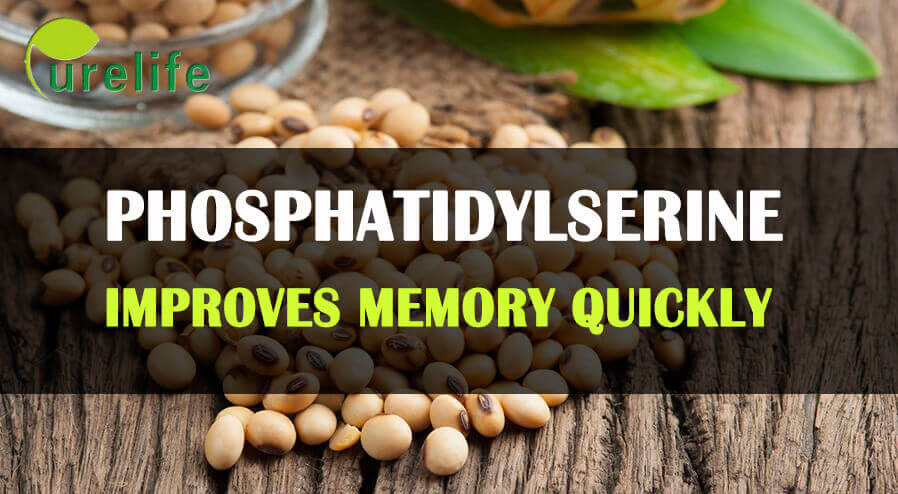Phosphatidylserine improves memory
Phosphatidylserine (PS) is a type of phospholipid that is an important part of the cell membrane. It exists in every cell of the body, especially in the brain. Generally, the phosphatidylserine content in the diet is small. Lecithin (soybean, egg yolk) also contains a very small amount of PS. Therefore, the cost of extracting phosphatidylserine from soybeans is very high, and phosphatidylserine is the essence of soybean phospholipids. Phosphatidylserine improves memory quickly, as it can assist in the conduction of electrical impulses and facilitates the activity of neurotransmitters involved in learning, memory, and mood.

Studies have shown that phosphatidylserine can affect the transmission of chemical information in the brain and help brain cells store and read data. It is an important nutrient for maintaining normal brain memory, response, and healthy emotions. Also, Phosphatidylserine can increase the number of synapses in the brain and promote glucose metabolism in brain cells, thus making brain cells more active and enhancing thinking ability. At the same time, phosphatidylserine is also one of the main components of brain nerves. It can nourish and activate the activity of various enzymes in the brain, delay the reduction process of neurotransmitters, and help repair and renew damaged cells in the brain. In addition, phosphatidylserine can also significantly reduce the level of stress hormones in brain workers, reduce stress, relieve brain fatigue, and promote concentration, enhance alertness and memory, and relieve bad mood
Four functions help the brain function efficiently.
1 .Phosphatidylserine improves brain function, focus and memory.
As you grow older, phosphatidyl serine and other important brain chemicals gradually decrease, resulting in reduced memory and cognitive ability. Supplementing phosphatidylserine can increase the number of brain synapses, the mobility of brain cell membranes, and promote glucose metabolism in brain cells, thereby making brain cells more active, promoting concentration, and improving alertness and memory. In Italy, Scandinavia, and other European countries, Phosphatidylserine supplements are widely used to treat cognitive disorders and loss of memory in old age.
In recent years, a large number of meta-analyses of phosphatidylserine have been done in Europe and the United States (meta-analysis refers to the systematic quantitative or qualitative synthesis of multiple independent research results on a certain issue). Its main purpose is to reflect the previous research results more objectively and comprehensively. Clinical trials involving nine double-blind, placebo-controlled, and 1224 patients were tested, and the results showed that the parameters of cognition and memory improved significantly after the supplementation of phosphatidylserine. There is no doubt that supplementing phosphatidylserine improves long-term memory, long-term cognition, and the ability to speak freely and logically.

- Relieves stress, promote the recovery of brain fatigue, and balance emotions
A number of studies have shown that phosphatidylserine significantly reduces the level of excessive stress hormones in working stress, reduce stress, and relieve brain fatigue; Phosphatidylserine can also act on the level of neurotransmitters in the brain that affect mood and help relieve bad emotions(such as despair ,depression, etc.).
- Helps repair brain damage
Phosphatidylserine is one of the main components of brain nerves, it can nourish and activate the activity of various enzymes in the brain, which can delay the reduction process of neurotransmitters and help repair, renew damaged cells in the brain and remove harmful substances. Meanwhile, PS reverses age-related memory deficits, especially in improving learning and memory for names. According to research, PS restores memory of the elderly to the levels of 14 years ago, with 66-year-olds having the same memory as 52-year-olds after 12 weeks of consumption of phosphatidylserine.
- Improves learning performance
A double-blind and placebo-controlled test was done by researcher to verify the effect of phosphatidylserine to relieve mental stress. Healthy college students took 300 mg of phosphatidylserine every day for 30 days. They need to complete mathematical tests with a certain difficulty within a given time, and record their response to stress. The result shown that students who took phosphatidylserine had better reflexes, confidence and performance than control groups, and they also performed better in exams. Another study also found that the students who took phosphatidylserine for 40days had significantly improved their verbal and nonverbal memory.
Phosphatidylserine improves memory quickly, but where can we get it?
Phosphatidylserine is a naturally occurring component in foods and is also present in breast milk. Both meat and fish contain phosphatidylserine, and it is higher in the brain or internal organs (such as liver and kidney). But the content of PS in dairy products and vegetables (except beans) are very small. In general, if more meat and fish in the diet, the intake amount of phosphatidylserine is approximately 180 mg/day. If the fat content in the food is low, the daily intake of phosphatidylserine will be only 100mg, or even less than 50 mg. According to statistics, the gap between our daily intake amount of phosphatidylserine and normal demand amount is between 70 and 150 mg, and vegetarians are particularly lacking, with a gap of 200 to 250 mg. For these reasons, we need to supplement 100 to 300 mg of pure phosphatidyl serine daily, which is even more important for vegetarians, low-fat or low-cholesterol dieters, and the elderly


